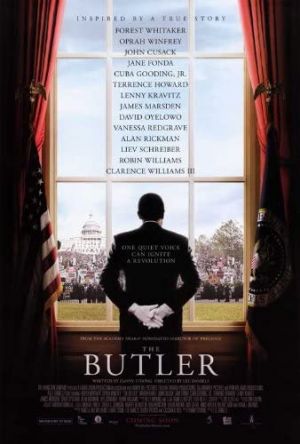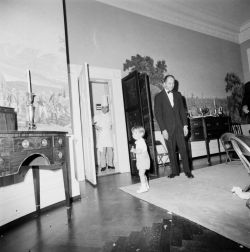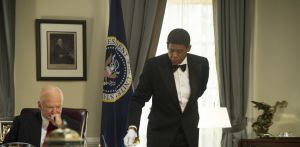The Butler (2013)
The Bulter is an American historical drama movie who released on August 16, 2013 in United State. Directed by Lee Daniels and produced by Pamela Oas Williams, Laura Ziskin, Lee Daniels, Buddy Patrick and Cassian Elwes. It starring
- Forest Whitaker as Cecil Gaines
- Oprah Winfrey as Gloria Gaines
- Mariah Carey as Hattie Pearl
- John Cusack as Richard Nixon
- Jane Fondaas Nancy Reagan
- Cuba Gooding Jr. as Carter Wilson
- Terrence Howard as Howard
- Lenny Kravitz as James Holloway
- James Marsden as John F. Kennedy
- David Oyelowo as Louis Gaines
- Vanessa Redgrave as Annabeth Westfall
- Alan Rickman as Ronald Reagan
- Liev Schreiber as Lyndon B. Johnson
- Robin Williams as Dwight D. Eisenhower
- Clarence Williams III as Maynard
This 132 minutes movie is loosely based on the life of Eugene Allen, a 34-year-old butler in the White House during eight presidents. Allen’s top priority was to make the White House a comfortable residence for each chief executive and his family.[1] In fact, it is so loosely based that it is difficult to decide which parts of the plot are based on the actual life of Allen, and which parts are added for dramatic effect.
Plot
The film begins with Cecil Gaines working on a cotton plantation with his father and mother in 1926. The white plantation owner raped his mother and the father was shot and killed. The grandmother of the cotton plantation owner felt sorry for him, and then let Cecil work in the house as a servant. Cecil was trained to become a tenant, eventually ran away and learned how to be a housekeeper. It was very difficult to be a black housekeeper at that time, because a person could not respond to conversations, which often included racist remarks and prejudices.
In 1957, after the White House administrative staff were impressed by his behavior and work at the Excelsior Hotel in Washington, DC, he was invited to accept the position of butler among the White House black butlers.
During the presidency of Eisenhower to Reagan, Cecil and other butler staff remained, serving as a first-hand but silent testimony to history and the internal operations of the Oval Office during the civil rights movement. people. Cecil continued to perform his duties in the White House, regardless of personal opinion, but as his sons were affected by the social and political turmoil characteristic of the 1960s and 70s, domestic tensions intensified. Faced with the destruction to her family and Cecil's negligence in taking care of her first family, Gloria turned to alcoholism and neighbors' embraces. When Cecil struggled to deal with his family's behavior and his own conscience, he found himself at the crossroads of previously unimaginable social changes.[2]
Pros
Butler received positive reviews from critics. Alex Shockley said: “Overall, I think this film is a good portrayal of the difficult times for blacks throughout the 1900s. The film that took place during the Civil Rights Movement made I have a better understanding of movies and a deeper understanding of the historical background. It is important for people to watch movies like Lee Daniel's movie "The Butler" because It gives people in the 21st century a glimpse of the history of this country. I also believe that this shows the fact that even if we get so far, there is still a lot to do.[3]
An American film critic and author Todd McCarthy also said in The Hollywood Reporter that "emotionally effective" drama is "always engaging, often entertaining and certainly never dull." He observed: "This is not an artful, tidy or sophisticated film, but its subject and his stationary odyssey are of such a singular nature that, as a great playwright once wrote, attention must be paid to such a person."[4]
In The New York Times A.O. Scott, meanwhile, praised the movie as "a brilliantly truthful." Scott writes: "The history of repression, protest and reform did not just happen on the abstract plane of activism and politics, but also in the lives of ordinary families, who were always doing more than just suffering and struggling. The genius of The Butler lies in the sly and self-assured way it connects public affairs to private experience."[5]
Reference
- ↑ https://www.whitehousehistory.org/the-life-of-eugene-allen
- ↑ https://morethanthehelpingbutler.weebly.com/the-butler-analysis.html
- ↑ https://sites.psu.edu/academy/2016/03/27/the-butler-movie-analysis/
- ↑ https://www.hollywoodreporter.com/news/lee-daniels-butler-what-critics-607292
- ↑ https://www.nytimes.com/2013/08/16/movies/lee-daniels-the-butler-stars-forest-whitaker.html?pagewanted=all


